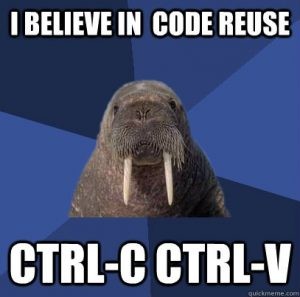--Originally published at Hermes's Blog
As the title says, it is completely unnecessary to rewrite code that it has already been written, it is, most of the time, a waste of your time and effort. With all the open source code available nowadays, it is really probable that you find whatever you are looking for on sites like github, gitlab, bitbucket or any other site, and if you don’t find it, well, then now you know what’s going to be your next open source contribution. You should really focus on writing building on top of what others have already done, also, it is worth to notice that you should be writing reusable code as well.
Some tips on writing reusable code:
- Don’t repeat yourself: if you find yourself writing the same code several times, probably you should move that piece of god to a module or something alike.
- Make a class/method do just one thing: remember the Unix philosophy? write programs that do one thing and do it well, also, write these programs to work together, the secret is in writing generic code to accomplish one simple thing, then use the output of that as input of another program to accomplish a more complex task, don’t make code too generic tough, or it will be difficult to find a purpose to it.
- Write unit tests for your classes and make it easy to test classes.
- Remove the business logic or main code away from any framework code.
- Try yo think more abstractly and use Interfaces and Abstract classes.
- Write code that can be easily extended in the future, for code leverage of course.
- Don’t write code that isn’t needed, if you doubt if the code is needed, then it is not, just leave it out.
- Try to reduce coupling, avoid modules/classes depending on each other.
- Be more modular, again, the Unix philosophy.
- Write code like your code is an External API, write everything modular and do one thing, then make these components work together to accomplish one common objective, by the end of the day you will have nice, modular and reusable code.

Sources:
http://hoskinator.blogspot.mx/2006/06/10-tips-on-writing-reusable-code.html





